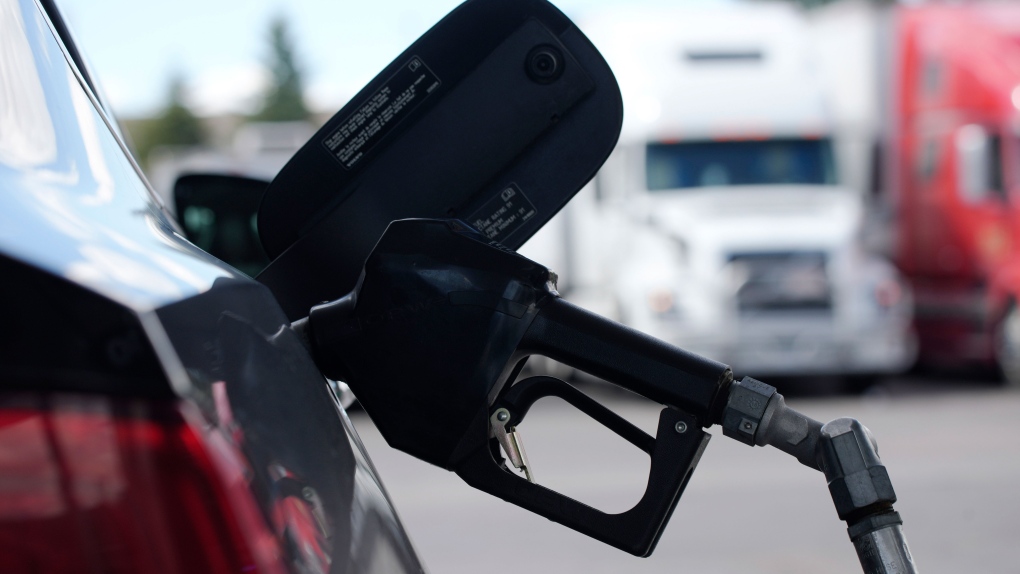'You’re going to see $1.51 tomorrow morning': Gas prices continue to soar
 A pump handle hangs from a car at a gas station as motorists take to the road to start the Memorial Day weekend, Thursday, May 27, 2021, near Cheyenne, Wyo. (AP Photo/David Zalubowski)
A pump handle hangs from a car at a gas station as motorists take to the road to start the Memorial Day weekend, Thursday, May 27, 2021, near Cheyenne, Wyo. (AP Photo/David Zalubowski)
Gas prices are reaching a record high across the province, including in Windsor-Essex County.
Drivers were filling up at over $1.50 a litre Friday, and they can expect that number to go even higher this weekend.
“You’re going to see $1.51 tomorrow morning and you’re going to see $1.52.09 on Sunday morning,” says Dan McTeague of Canadians for Affordable Energy.
“Some stations may hold off until Monday.”
The gas expert says there isn’t enough oils being produced which creating a significant pressure on price.
“What’s gonna drive this is the negotiations between Russia and Ukraine, Europe and of course United States.”
If those discussions go well, McTeague believes prices could fall five to 10 cents a litre.
“If it doesn’t go well, then look for prices to march towards $1.60 a litre and there will be nothing to stop that from happening,” he says.
Lack of investment in fossil fuels and a weak Canadian dollar is also contributing to soaring prices, according to McTeague.
“They just keep going up and up and up, but you have to drive so you have to fill up your car,” one driver told CTV News Windsor on Friday.
“Well obviously they’re too high and a big part of that is the carbon tax and it’s only gonna get worse,” added another commuter.
The Trudeau government will be increasing the carbon tax another two-and-a-half cents a litre April 1.
“And on April 15th we’re going to see an increase of about five cents a litre when we shift from winter to summer gasoline,” McTeague says. “Those two factors alone are worth seven and a half cents a litre.”
Creating a whole new meaning of “paying at the pump.”
“What we’re talking about right now is a 20 per cent increase,” McTeague says. “That’s an average hit to most homes about $500 a year.”
CTVNews.ca Top Stories

Israel gave U.S. last-minute warning about drone attack on Iran, Italian foreign minister says at G7
The United States told the Group of Seven foreign ministers on Friday that it received 'last minute' information from Israel about a drone action in Iran, but didn't participate in the apparent attack, officials said.
NEW After hearing thousands of last words, this hospital chaplain has advice for the living
Hospital chaplain J.S. Park opens up about death, grief and hearing thousands of last words, and shares his advice for the living.
'It was all my savings': Ontario woman loses $15K to fake Walmart job scam
A woman who recently moved to Canada from India was searching for a job when she got caught in an online job scam and lost $15,000.
Families to receive Canada Child Benefit payment on Friday
More money will land in the pockets of some Canadian families on Friday for the latest Canada Child Benefit installment.
After COVID, WHO defines disease spread 'through air'
The World Health Organization and around 500 experts have agreed for the first time on what it means for a disease to spread through the air, in a bid to avoid the confusion early in the COVID-19 pandemic that some scientists have said cost lives.
American millionaire Jonathan Lehrer denied bail after being charged with killing Canadian couple
American millionaire Jonathan Lehrer, one of two men charged in the killings of a Canadian couple in Dominica, has been denied bail.
DEVELOPING G7 warns of new sanctions against Iran as world reacts to apparent Israeli drone attack
Group of Seven foreign ministers warned of new sanctions against Iran on Friday for its drone and missile attack on Israel, and urged both sides to avoid an escalation of the conflict.
BREAKING Iran fires at apparent Israeli attack drones near Isfahan air base and nuclear site
An apparent Israeli drone attack on Iran saw troops fire air defences at a major air base and a nuclear site early Friday morning near the central city of Isfahan, an assault coming in retaliation for Tehran's unprecedented drone-and-missile assault on the country.
Ottawa to force banks to call carbon rebate a carbon rebate in direct deposits
Canadian banks that refuse to identify the carbon rebate by name when doing direct deposits are forcing the government to change the law to make them do it, says Environment Minister Steven Guilbeault.































